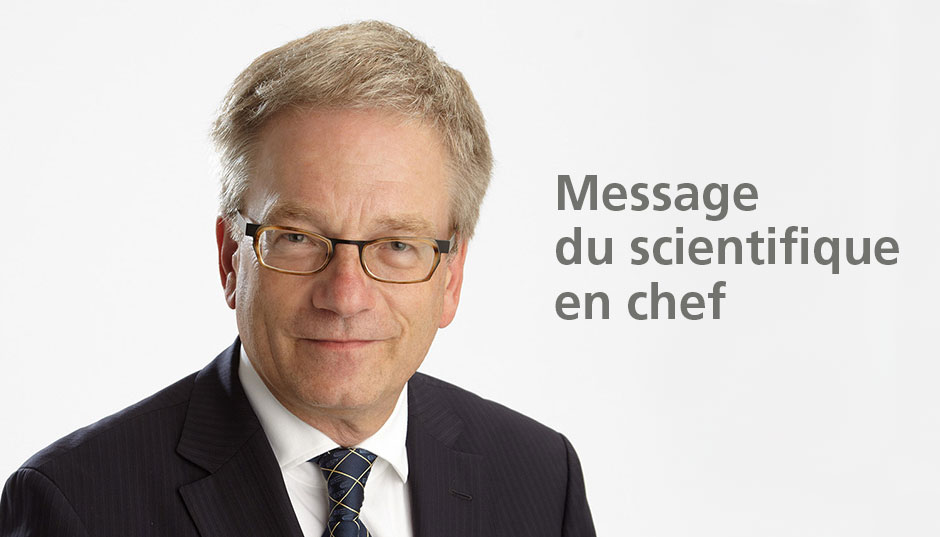The past six months have seen a great many changes! Indeed, since the launch of the National Research and Innovation Policy (NRIP) last October, we at the Fonds de recherche du Québec (FRQ) have been working on various programs associated with the initiative, up until the change of government and of departmental structure. The FRQ are now under the direction of the Minister of Higher Education, Research and Science (MESRS), Yves Bolduc. I have already had the chance to meet with the new minister on several occasions, and he is very excited at the idea of working with the Fonds and the community of researchers and research student to ensure that the Québec government not only maintains, but increases, funding for research and innovation, while enhancing the visibility of our research teams and research students both at home and abroad. The scientific directors of the three Fonds, the members of the FRQ team and I are working in close collaboration with Minister Bolduc’s cabinet and the ministry staff in order to meet these objectives. My discussions with the Minister have been highly stimulating and engaging. He wants action, and so do I!
In addition, our respective teams will maintain close ties with the Ministry of the Economy, Innovation and Exports (MEIE) and the cabinet of Minister Jacques Daoust to ensure that research and innovation remain strongly linked within the framework of the NRIP or its equivalent. Knowing the two ministerial teams, I am certain that everything will turn out for the best.
As you all know, 2014-2015 is going to be a difficult year due to Québec’s financial situation. Despite calls for government-wide efforts to cut spending, the budgetary appropriations announced this week by Québec’s Minister of Finance show a 12.9% increase in the overall permanent budget of the three Fonds, from 147.8 million dollars in 2013-2014 to 166.9 million in 2014-2015. These appropriations will allow the Fonds to increase the number of scholarships offered to our research students; supporting new generations of researchers remains one of our top priorities.
Strategic plans, annual action plans, policies, strategies: approval and development
The 2014-2017 strategic plans of each Fonds were adopted by the agencies’ boards of directors at last April’s board meetings. As soon as the plans have been approved by Minister Bolduc and the government, we will make them public and begin their implementation. Thanks to all of you who sent us your comments over the 12 months of consultations. We look forward to launching the first year of the strategic plans with the deployment of the 2014-2015 action plans, adopted by the boards of directors in April. We are now awaiting the Minister’s approval for the plans—as well as for the budgets for the current year—, which we are sure to obtain very soon.
Among the other key dossiers of the FRQ, I would like to mention the question of responsible conduct in research. We are finalizing our policy in this regard and the team of the Director of ethical and legal affairs, in collaboration with the ethics and scientific integrity committees of the three boards of directors, has done a remarkable job. Extensive consultation has already been held, culminating in a highly anticipated and well-attended meeting at the last Acfas Congress on May 13, 2014. We expect to launch our policy by the fall, once we have obtained the approval of the boards of directors. In the meantime, the FRQ remain attentive to the stakeholders affected by this policy.
We are also developing our International Research Strategy (fall 2014) and our strategy for free access and open government. Significant work has been carried out by the program directors of the Fonds and their respective teams to further harmonize our common rules and regulations, thus facilitating bridge building between the Fonds (grants and awards) and intersectoral research. This was a lot of work for the staff of the three funding agencies, and should lead to the simplification of our programs.
Finally, our knowledge mobilization strategy was approved by the boards of directors at the April board meetings. While this strategy is primarily aimed at providing better support for researchers and research students in their activities for the transfer, commercialization and dissemination of research results to potential users, the general public and scientific culture components of the strategy are also extremely important. We must all be committed to encouraging our fellow citizens and political leaders to take a greater interest in research and higher education.
Since the beginning of my mandate, I have often spoken about the importance of partnerships and of the four ‘I’s: intersectoral, inter-profession, international and interuniversity. In these somewhat difficult times it is important to develop new partnerships and new collaborations within the public and private sectors, both locally and internationally. I spoke on this topic in an address I delivered at a CORIM conference dinner in February, in a speech I made at the 50-year anniversary conference of INSERM, and during an interview on RDI. These new partnerships and collaborations will increase the impact of our investments on society through technological, social and economic innovations. They will also help us to better deal with major social challenges addressed by the NRIP, such as demographic change and sustainable development. We are in the process of developing a strategy in this regard.
A third key challenge concerns our identity, our creativity and our entrepreneurial spirit. For example, consider the cooperative model or the video game industry. How can we best adapt these approaches to an intersectoral model? What can we learn from each other? With your support, Québec can become a world leader in this area, but I need you in order to make it happen. Are you ready to meet the challenge?
On a different note, I mentioned in my last message that Montréal was a candidate for hosting the permanent secretariat of the international organization Future Earth, which aims to foster the research, knowledge development and innovation required by nations and their leaders to meet the challenges of sustainable development and climate change. Out of several major cities around the world that responded to the call for proposals, the selection committee recently decided on Montréal! This is excellent news for Québec research. I would like to remind you that Montréal’s bid was submitted by a consortium that included Montréal universities. For an international organization like Future Earth to have its permanent secretariat in Montréal will facilitate international collaboration for our scientific community and will bring recognition for Québec and its researchers in the field of sustainable development.
In closing, the Fonds de recherche du Québec – Santé is celebrating its 50-year anniversary this year. Created in 1964 in the middle of the Quiet Revolution, the agency has played a leading role in the development of research and the training of researchers over the past five decades. Several activities have been planned to mark the event, including the Recherche intersectorielle: de l’infiniment grand à l’infiniment petit pour la santé de demain symposium next September. A dedicated Web space, Le fil de la recherche en santé au Québec, has been developed for the occasion, which I invite you to visit (http://www.frqs50ans.com/). Certain joint activities are being organized with long-time FRQS partner INSERM (Institut national de la santé et de la recherche médicale), which is also celebrating its 50th anniversary in 2014. In this context, I was invited to deliver an address at the INSERM symposium last April, at the Sorbonne Grand Amphitheatre, Paris.
Rémi Quirion, O.C., C.Q., PhD, FRSC
> See more messages to the community




